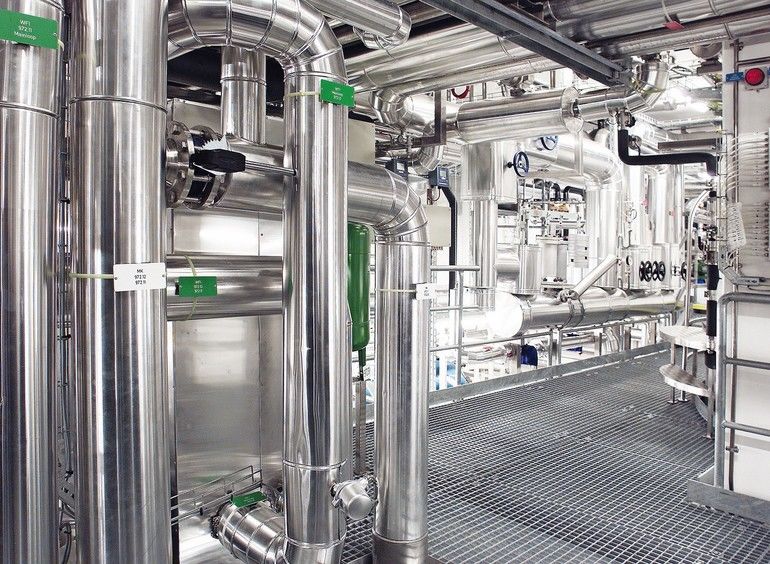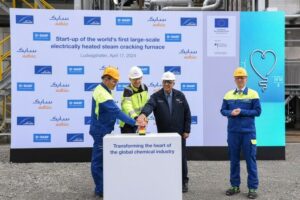Strict environmental regulations, a market geared towards more sustainable products and processes, and high competitive pres-sure from emerging markets, especially for bulk quantities at low manufacturing costs – the challenges the European industry is facing today are far from trivial. While Europe has already lost the battle for many low-cost base chemicals, now the fight is for the future of fine chemicals with higher profit margins.
More than 20 years ago, the American chemists Paul Anastas and John Warner published the book „Green Chemistry: Theory and Practice“ (Oxford University Press; 1998), in which they describe twelve characteristics of sustainable chemical syntheses (see also text box). Starting from research and development at universities and in the pharmaceutical sector, green chemistry has now become a powerful tool for technological innovation in the chemical industry.
Green engineering
Green chemistry for a more compatible design of chemical syntheses is primarily developed by the R&D units of such companies that own the production technology. However, the industrial success of a new process depends profoundly on a planning partner who guarantees the technological and economic feasibility from the beginning to shorten the time to industrial implementation. It also requires a special approach to process engineering, an approach which can be defined as „green engineering“: Engineering in the service of green chemistry.
The implementation of the twelve principles requires, for example, that process engineering goes back to the laboratory and promotes a proactive and highly interdisciplinary exchange between chemists and engineers.
Energy efficiency
Improving energy efficiency is no easy task for a chemist who develops and evaluates alternative syntheses on a gram scale in the laboratory. Here, the engineering tools of predictive modelling (including the analysis of energy flows and optimisation) and process simulation are helpful. These instruments are already available for an initial concept study to obtain information on the energy needs, environmental impact and economic conditions of the synthesis to be developed. This allows for important decisions to be made pro-actively and as early
as in the R&D phase, which will have a positive impact on the industrial implementation (e.g. evaluation of alternative sepa-ration processes to increase yield at lower costs).
VTU has extensive experience in the field of increasing the energy efficiency of chemical plants. Thanks to the know-how of the process engineers, numerous improvements have become possible that go far beyond simple heat recovery or known measures such as pump control. The greatest potential usually lies in process management. For example, simple mechanical changes to guide different feed streams in evaporation or distillation plants can result in high savings. At Borealis in Linz, Austria, CO2 capture in the feed gas for ammonia synthesis was increased by simple means, resulting in considerable energy savings. The project was awarded a prize by the Austrian Ministry of Agriculture, Regions and Tourism.
Monitoring of process parameters
Real-time analysis of process parameters allows for the timely remedial action to meet production requirements, reduce by-product formation and increase yield, which is one of the targets of a green process. The effects of relevant measured and manipulated variables are determined by the engineers during the development phase, so that they can then implement optimal and robust strategies for monitoring process parameters in the plant. VTU Engineering successfully uses the combination of quality by design (QbD) and process analytical techniques (PAT). With QbD, a test matrix is specified for relevant measured or manipulated variables, which is statistically evaluated with PAT and used for predictions. This allows for the influences and weighting of the process variables on, for example, reaction time, yield, formation of by-products and, finally, quality to be determined and validated. QbD and PAT have become widely used in the pharmaceutical sector as they make an important contribution to speeding up and rationalising expensive experimental campaigns. The advantages of these tools can also be proven in any other context.
Flexibility is imperative
Process engineers today have sufficient tools available to meet the challenges of green chemistry. However, project planning must be reviewed on an ongoing basis and adapted to the results achieved after each development stage. Where appropriate, more flexibility should be adapted to improve the process as well as to evaluate ways that are unknown, in order to be able to implement the project competitively on an industrial scale. VTU has a consolidated concept for sustainable process plants, which makes use of their many years of experience, e.g. with biotechnological processes or energy recovery. The engineering tools are adapted to the specific requirements of the respective project. There are many examples of how this flexible VTU approach proved to be decisive for increasing client sustainability, including:
- A process evaluation for fuel-from-CO2
- Plants for solvent recovery (e.g. ethanol in pharmaceutical quality, NMP, DMSO)
- The planning of a demonstration plant for on-site on-demand H2 production
- Lithium-ion battery recycling
- The biocatalytic production of plastics
- Processes for the treatment of bio-based oils for use in hydrogenation plants
As a planning partner, VTU also focuses on research and cooperation. With its own technical centre and close cooperation with various institutions, including the Graz University of Technology, the engineers are constantly striving to broaden and improve their know-how.
VTU Engineering Deutschland GmbH, Hattersheim
Sustainable Synthesis: Twelve characteristics
Twelve principles characterise sustainable syntheses (Anastas and Warner, 1998):
- Prevent waste
- Atom economy – the product of a chemical reaction should have a molecular weight as close as possible to the sum of the molecular weights of the starting products, so that few by-products are formed
- Select new, less dangerous synthesis pathways
- Prefer syntheses of new molecules without risk to humans and the environment
- Use solvents that are harmless to humans and the environment
- Consider energy efficiency in new synthesis pathways
- Use renewable raw materials
- Reduce derivatives and intermediates, e.g. avoid protective groups through better regioselectivity or stereoselectivity
- Prefer (bio-)catalytic over stoichiometric reactions
- Consider later degradation of new molecules – after use, products should be able to degrade naturally
- Use real-time monitoring during production, e.g. to prevent contamination in the process
- Consider safety aspects to prevent accidents and avoid dangers









